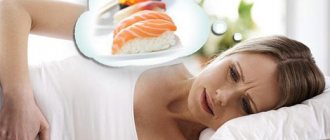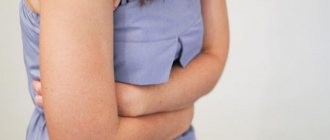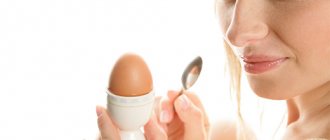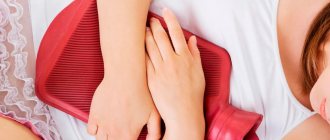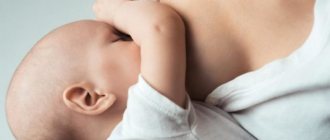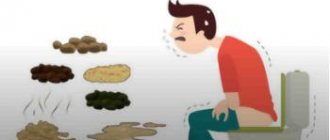What does orange loose stool mean and how to treat it?
Diarrhea is a condition in itself that causes concern, but even more worrying is diarrhea that is unnaturally orange in color. It can be caused by both dietary habits and dangerous pathologies that require immediate treatment.
Causes of orange diarrhea
The color of stool is determined by many factors. They can be divided into two categories:
- nutritional features;
- pathological phenomena.
In the first case, the reasons for the appearance of orange liquid stool are as follows:
- frequently consumed orange-colored foods (carrots, apricots, pumpkin);
- high concentration of carotene in preferred food;
- taking certain medications;
- the use of vitamin complexes with orange dye or a high dose of retinol.
The appearance of orange diarrhea for these reasons does not cause harm to the body. It is enough to change your diet, choose other multivitamins, and diarrhea will disappear on its own in a few days.
If it is clear that orange-colored diarrhea is not caused by medications or carotene-rich foods, then the cause should be sought in a serious pathological process. It is necessary to immediately contact a medical facility and undergo an examination to establish a diagnosis.
Orange diarrhea can be a symptom of the following diseases:
- hepatitis, other liver disorders;
- gastritis, peptic ulcer;
- stones in the gall bladder and bile ducts;
- lesions of the pancreas;
- renal pathologies;
- diseases of the pulmonary system;
- cystitis, pathological changes in the bladder;
- hormonal imbalances;
- infectious lesion.
There is a relationship between the color of stool and the severity of the disease. The more intensely colored the discharge, the more pronounced and acute the pathological process.
In addition to diarrhea, the listed pathologies may be accompanied by the urge to vomit, abdominal pain, and increased body temperature.
Orange diarrhea can occur not only in adults, but also in infants. In a newborn baby, feces of an unnatural color are a sign that the absorption of mother's milk or artificial nutrition in the digestive tract has not occurred completely, and there are metabolic problems.
If orange diarrhea in a baby is accompanied by vomiting and fever, then the most likely cause is intoxication of the body. Also, yellow-orange stool can be a signal that the baby is experiencing a pathological process in the liver or biliary system. In the latter case, the yellowish color of the stool is given by bile produced in excess.
In women, an orange tint to stool may be associated with hormonal changes during pregnancy and menopause, and is also observed in cases of thyroid dysfunction and diabetes.
Diagnostics
If the symptoms indicate that orange diarrhea is caused by pathological processes in the body, you should not delay going to a medical facility. At the first stage, the doctor collects an anamnesis. It is necessary to answer all the questions asked: what foods were consumed the day before, what medications were taken, and what symptoms were noted.
The following diagnostic measures are carried out:
- stool enzyme analysis;
- blood and urine tests;
- Ultrasound of the abdominal organs;
- proctological examination for the presence of pathological formations in the intestines;
- endoscopic procedures to identify pathologies of the upper digestive tract;
- determination of the degree of dehydration.
Treatment for orange diarrhea
Therapy is prescribed after identifying the disease that provoked loose stools.
If the cause of orange diarrhea is an inflammatory process, then complex treatment is used, including taking anti-inflammatory medications, relieving symptoms and preventing dehydration. Medicines are prescribed by a doctor.
If the cause of diarrhea is an infectious lesion of the body, then hospitalization of the sick person is required. In a hospital setting, measures are taken to normalize the water-salt balance, prevent dehydration, and restore the intestinal microflora. To destroy pathogenic microorganisms that cause diarrhea, antibiotics and anti-inflammatory drugs are prescribed.
Auxiliary medications include sorbents, immunostimulants, and enzymes. Most often this is:
- "Regidron" - prevents dehydration;
- “Smecta” is a sorbent based on natural ingredients that eliminates excess gases and removes toxins from the digestive tract;
- “Creon” is an enzyme preparation for normalizing digestion;
- “Enterol” is an immunostimulant and probiotic, inhibits viral infection, normalizes intestinal microflora;
- “Enterofuril” is an intestinal antiseptic, eliminates manifestations of intoxication, and prevents complications.
An excellent fixing agent is rice water. For 2 tablespoons of rice you need to take 0.5 liters of water. Boil water, add cereal to it, bring to a boil again, cook for 40 minutes over low heat. Strain the finished product. Take 1/4 cup every 2 hours until the condition improves.
Food should be consumed often and in small portions. The menu should include fastening products:
- slimy porridge;
- baked apples and pears;
- bananas;
- vegetable broths;
- white flour toast.
With diarrhea, a large amount of fluid leaves the body. To replenish it, you need to drink as much water as possible (but only non-carbonated), herbal teas, fresh squeezed juices, fruit drinks, dried fruit compotes.
After eliminating diarrhea, you must adhere to dietary rules for another 2 weeks, drink enough water and herbal teas with a strengthening effect.
After curing diarrhea, you should thoroughly wash the toilet with a disinfectant and wash hygiene and bedding. You should not go to work and send your child to school immediately after illness - it is advisable to remain on sick leave for at least 2 more days.
Prevention
Prevention of intestinal disorders involves:
- compliance with hygiene rules;
- Thorough hand washing after going to the toilet, visiting public places (especially during infectious diseases), before preparing food;
- washing dishes and kitchen utensils with hot water and detergent;
- separate placement of raw and cooked food;
- storing perishable food in the refrigerator;
- monitoring the expiration date of products;
- thoroughly frying and boiling food.
Orange diarrhea is an abnormal phenomenon that definitely needs to be paid attention to. Even if there are no other symptoms, it is worth seeing a doctor to find out the cause of the disorder. Prescribed therapy, a recommended diet and adherence to a drinking regime will help you cope with unpleasant symptoms quickly and without complications.
Source: https://odiaree.ru/o-diaree/ponos-oranzhevogo-cveta.html
Treatment
Orange diarrhea does not require treatment if it is caused by external causes - food and medications, in which case it is necessary to adjust your diet, eliminating excess beta-carotene from it, and replace medications with analogues. Then digestion returns to normal in a matter of days without any consequences. To speed up the normalization of stool, you can use sorbents Smecta, Atoxil, and activated carbon. In case of significant symptoms, it is permissible to use Loperamide, which suppresses peristalsis.
If orange diarrhea in an adult is caused by an internal cause, it requires qualified treatment.
Important! Do not self-medicate, do not resort to the advice of strangers, take care of your health and that of your loved ones. Be sure to consult a doctor if orange, loose stool appears in an adult, not to mention a child, whose body is much more sensitive.
It is important to establish an accurate diagnosis in order to eliminate the cause of orange diarrhea in an adult as a result of treatment, and not just relieve the symptoms. First of all, if you notice red-colored diarrhea in an adult, you need to call a doctor. Sometimes, if the pathology is severe, the patient needs urgent hospitalization, possibly surgical treatment, for example, for cholelithiasis. If an infection is present, hospitalization with an antibacterial and anti-inflammatory course, possibly antibiotics, is also required. For inflammation of internal organs, anti-inflammatory therapy is carried out.
But first of all, you need an examination and diagnosis, which includes:
- laboratory analysis of stool, including enzymes
- general blood analysis
- general urine analysis
- Ultrasound of internal organs
- gastrointestinal examination
First aid for a patient with orange diarrhea is as follows:
- plenty of warm drinks, warm, strong, sweet tea is best, in small sips, but often;
- the drug "Regidron" (instructions for use on the package, drink in small sips with breaks) with repeated repetitions of diarrhea to restore the water-salt balance in order to prevent dehydration of the body, which is very dangerous;
- sorbent (for example, activated carbon, 1 tablet per 10 kg of patient weight) if food poisoning is suspected.
Attention! In this case, folk remedies should be used only as an additional method of therapy and only when the general picture of the disease is completely clear. You should not waste time on dubious methods, but take advantage of modern diagnostic and treatment capabilities. And folk remedies will help you in the recovery period.
So, why orange diarrhea may appear, how to behave in this case, how to help the patient before the doctor arrives and what kind of medical assistance may be needed, you now know. Do not forget to consult with a specialist in time, follow his recommendations, and then you will reduce problems to a minimum. Be healthy!
Causes of orange diarrhea in adults
Diarrhea can be caused by various reasons, ranging from foods to serious pathologies in the body.
At the same time, there are many differences in the symptoms of diarrhea, in the characteristics of its course and specific signs, which can be used to navigate and immediately begin the right measures to eliminate not only the symptoms, but also the causes of the unpleasant condition. Among the special signs of diarrhea, the color of stool is very indicative.
. What does orange diarrhea signal, and what are the treatment methods for this stool disorder?
Features of nutrition and medications
The reason that stool appears orange may be due to eating foods that contain natural or artificial dyes. Also, the use of certain medications leads to the fact that in some cases people experience a change in the color of their stool.
Food
The most common cause of stool color change is eating large amounts of red or orange fruits or vegetables. May affect the color of stool:
Carrots and pumpkin pulp color feces especially strongly. Spices cause orange-colored stool to change color. Turmeric, paprika, and red pepper give stool a bright color.
Eating large amounts of foods containing synthetic dyes can also cause stool to change color. If a person eats too many orange vegetables or consumes them for a long time, orange feces in an adult may become liquid due to overeating.
Medicines
An overdose of vitamin A causes a person to have loose, orange-colored stools. Some multivitamins that contain carotene also contribute to a change in stool color if taken for a long period of time. Patients may notice yellowing of the skin on the palms and feet, and a change in the color of the whites of the eyes.
The stool turns orange if the patient takes the drug Rifampin to treat tuberculosis. Drugs such as Nifuroxazide and Furazolidone can also give an orange color to feces.
Oily diarrhea
Have you been struggling with GASTRITIS and ULCERS for many years without success?
Head of the Institute: “You will be amazed at how easy it is to cure gastritis and ulcers simply by taking it every day.
: January 11, 2020 at 1:49 pm
Our readers successfully use Monastic Tea to treat gastritis and ulcers. Seeing how popular this product is, we decided to bring it to your attention. Read more here...
Popular wisdom says: “We are what we eat.” Unfortunately, this statement does not address the fact that the food a person eats is properly processed. Even normal food is properly digested only if a person is completely healthy. Oil diarrhea occurs when there is a malfunction during digestion.
You should not immediately panic, as unusual diarrhea can occur after eating fatty fish. Such products contain specific oils that are difficult for the human body to absorb. In order not to disrupt the digestion process and not harm the intestines, the fish should be hung upside down so that harmful impurities come out of it.
Loose, oily stools also occur after eating the following foods:
- After eating a huge amount of tomatoes, but this is rare;
- Medicines intended for weight loss;
- Oral contraceptives.
Causes of oily diarrhea
Despite the fact that in most cases, such diarrhea occurs after eating certain types of foods, there is a possibility that the diarrhea appeared after the body was affected by the disease. Oily loose stools can be caused by the following diseases:
- Inflammation of the gallbladder. In addition to oil diarrhea, the patient may experience a dull pain in the right hypochondrium, which intensifies during meals or active movement;
- Inflammation of the colon;
- Inflammation of the pancreas caused by the consumption of smoked foods or alcoholic beverages. At the same time, a person experiences pain during bowel movements;
- Haemorrhoids. In some situations, oily diarrhea appears during bowel movements. If it is internal hemorrhoids, then no other symptoms may be observed;
- Steatorrhea. With this disease, up to 5 grams of fat are released from the body along with feces in one day, which gives the diarrhea an oily appearance. This is a rather dangerous disease that can cause a whole bunch of new ailments. If treatment is not started in a timely manner, it will be difficult to restore the body.
What to do with oily, loose stools?
Seeing changes in the stool, many people begin to panic, because they do not know what to do in these cases. It becomes even more uneasy when you see diarrhea with oil. First of all, you need to calm down, and then follow the small instructions:
- If strange discharge appears after eating fatty fish, you should immediately exclude it from the diet and the symptoms will go away on their own;
- Sometimes diarrhea with oil appears after taking medications. In this case, it is best to consult your doctor and think about replacing the medications that caused the change in stool with other drugs;
- May affect digestive problems due to errors in diet. To normalize the situation, you need to exclude smoked and fried foods from your diet. After this, you need to visit a gastroenterologist and do an ultrasound. In the absence of pain, you can take Smecta and enzyme preparations such as Creon or Mezim;
- If there is no doubt that oily diarrhea did not appear due to food, but due to a serious illness, you should undergo a diagnosis so that the doctor can prescribe the correct treatment.
Disorders of the liver and pancreas
Pathologies of the pancreas, accompanied by impaired enzyme production, lead to orange diarrhea in a person.
Changes in the color of feces are caused by the following diseases:
- Pancreatitis . With pancreatitis, the pancreas does not produce enough enzymes. This leads to disruption of the digestive processes and the appearance of feces of an unnatural color, diluting the stool in an adult, staining the feces orange or yellow
- Cancer . With this pathology, the patient’s stool is unstable, and there is either constipation or diarrhea. Stool color: from red-orange to colorless.
Also, liver diseases accompanied by impaired outflow or processing of bile can cause changes in stool color. Liquid orange stool is one of the symptoms of the following pathologies:
- Acute and chronic hepatitis . A feeling of heaviness in the right side of the abdomen, stabbing pain and frequent diarrhea are symptoms of the disease.
- Blockage of the biliary tract . The cause of impaired bile secretion may be stones, sand in the ducts, or inflammatory processes.
- Toxic reactions to taking medications, poisoning . With these pathologies, the number of red blood cells decreases, as they disintegrate and there is an increase in leukocytes in the blood.
Due to the increased breakdown of red blood cells, the level of free bilirubin in the blood increases in a person. An increase in the level of direct bilirubin in the blood leads to the development of jaundice. In this case, bile pigments, the appearance of which is associated with a violation of the processing of bilirubin by the liver, can be observed in both urine and feces.
Important! If a child’s orange liquid stool does not depend on nutrition, the baby complains of severe abdominal pain or cries for no reason, parents should be wary. Since such signs may indicate a problem with the liver or pancreas, you should consult a doctor as soon as possible.
Causes
All causes of orange diarrhea can be divided into two groups: natural and pathological.
Errors in nutrition
Natural causes are a common failure of digestion as a result of eating foods that the gastrointestinal tract cannot properly process, and the color of the stool indicates the corresponding color of the foods and the content of a large amount of beta-carotene in them. Beta-carotene, an antioxidant, directly affects the color of stool
. Such diarrhea can easily be eliminated by eliminating or limiting these foods in the diet and should not cause much concern.
Foods that cause orange diarrhea:
- carrot;
- orange;
- apricot;
- pumpkin;
- persimmon;
- orange pepper, etc.
These products just need to be consumed within reasonable limits so that there is not too much at once, then the digestive system can cope calmly and work without any failures.
In addition to nutrition, natural causes of orange diarrhea in an adult include taking certain medications, in particular multivitamins and nutritional supplements. In this case, there is also no need to panic, but try to do without these medications or replace them with others that do not cause bowel upset.
Pathological causes of brightly colored diarrhea
If the appearance of orange diarrhea was not preceded by the natural causes described above, that is, the consumption of foods high in beta-carotene and medications the day before, then this indicates a pathological cause - a serious disease of the body. In this case, you need to contact your doctor and undergo the necessary medical examination to find out the specific diagnosis and proceed to the correct treatment.
Internal pathologies leading to orange diarrhea are most often the following:
Source: https://gb4miass74.ru/simptomy/oranzhevye-kakashki.html
Consequences
The most severe consequence of diarrhea, even death, is dehydration.
Its initial signs are dry lips and oral mucosa, lack of urine for 3 hours or more, severe thirst.
Another complication is poisoning of the body with toxins of bacteria and viruses with the development of toxic shock.
If diarrhea is caused by viral hepatitis, the person is poisoned by his own waste. Inflammation of the liver eventually transforms into cirrhosis.
Oily orange diarrhea in an adult
Our readers successfully use Monastic Tea to treat gastritis and ulcers. Seeing how popular this product is, we decided to bring it to your attention. Read more here...
: January 11, 2020 at 1:49 pm
Popular wisdom says: “We are what we eat.” Unfortunately, this statement does not address the fact that the food a person eats is properly processed. Even normal food is properly digested only if a person is completely healthy. Oil diarrhea occurs when there is a malfunction during digestion.
You should not immediately panic, as unusual diarrhea can occur after eating fatty fish. Such products contain specific oils that are difficult for the human body to absorb. In order not to disrupt the digestion process and not harm the intestines, the fish should be hung upside down so that harmful impurities come out of it.
Loose, oily stools also occur after eating the following foods:
- After eating a huge amount of tomatoes, but this is rare;
- Medicines intended for weight loss;
- Oral contraceptives.
First aid for diarrhea and methods of treatment
When diarrhea occurs, which is accompanied by loose stools, you must first reconsider your diet in order to exclude foods that can only aggravate the situation, as well as alleviate the condition. It is also worth immediately taking measures to prevent the development of dehydration. In this case, drinking plenty of fluids is recommended. It is best to give preference to warm, strong and sweet tea. You need to drink it in small sips, but often. Also, if diarrhea recurs frequently and the bowel movements are quite large, then the special medical drug Regidron can come to the rescue. It is prepared according to the instructions that are on each sachet of the drug. The resulting solution is also drunk in small sips, taking short breaks for five to seven minutes.
Preventing digestive problems
Like any other disease, diarrhea is better prevented than treated. It is clear that the mustache suffers not only physiologically: the psychological state of the pet is very complex. The following preventive measures will help prevent pathology:
- The habitat must be kept in good sanitary conditions. You should regularly change and wash the bedding, clean the beds and furniture where the cat sleeps.
- You should not leave food in bowls, because this leads to poisoning.
- Industrial feed must be of high quality, preferably premium. When changing food or switching from natural products to dry ones, this must be done gradually. This way the body adapts better to new food.
- Disinfect the litter box regularly to reduce the amount of bacteria on the surface.
- From the first days of a kitten's appearance in the house, care should be taken to ensure timely comprehensive vaccination against major diseases.
- At least twice a year (ideally, once a quarter), cats are treated for intestinal parasites. This strengthens the animal's immune system.
- You should not keep open packages or bottles of household chemicals, medicines, and perfumes available. Accidental use of them causes dangerous poisoning.
- It is important to monitor your pet's contacts. Viral infections transmitted through the air from street animals are dangerous for an unvaccinated cat.
Following basic preventative measures will reduce the risk of digestive disorders and improve overall health.
Cat diarrhea can be of different types: with impurities of blood, mucus, black, green or white, watery or without complications. Separately, they talk about intestinal disorders in pregnant and lactating females, as well as in kittens. Medicines and a therapeutic diet will cope with the disorders, provided that the veterinarian’s recommendations are strictly followed.
The article is for informational purposes only. Contact your veterinarian!
Diet food
If you notice your cat has loose stools, what should you do first? It is necessary not to feed the animal anything for one day. But water should be given in large quantities. It will need to be boiled and cooled to room temperature.
While the animal is experiencing problems, it is not given any types of dairy, fermented milk products, fatty meats, or starchy foods. After one day, the patient begins to be fed in small portions. The norm is reduced by half, offering the sufferer low-fat food that is easily digestible.
The therapeutic diet involves split feeding 3-4 times a day. Prescribed medications are added to food in crushed or diluted form. Foods recommended for the disorder include:
- cooked white rice;
- boiled chicken meat without skin;
- boiled egg yolk.
Moist canned food for animals, specially designed for problem cases, are well absorbed and have an effect on the patient’s body. They do not have an irritating effect on the mucous walls of the gastrointestinal tract. It is allowed to return to the usual diet only after the mustachioed friend’s health has been completely restored.


